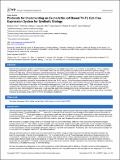Protocols for Implementing an Escherichia coli Based TX-TL Cell-Free Expression System for Synthetic Biology
Author(s)
Sun, Zachary Z.; Hayes, Clarmyra A.; Shin, Jonghyeon; Caschera, Filippo; Murray, Richard M.; Noireaux, Vincent; ... Show more Show less
DownloadSun-2013-Protocols for implem.pdf (481.8Kb)
PUBLISHER_CC
Publisher with Creative Commons License
Creative Commons Attribution
Terms of use
Metadata
Show full item recordAbstract
Ideal cell-free expression systems can theoretically emulate an in vivo cellular environment in a controlled in vitro platform. This is useful for expressing proteins and genetic circuits in a controlled manner as well as for providing a prototyping environment for synthetic biology. To achieve the latter goal, cell-free expression systems that preserve endogenous Escherichia coli transcription-translation mechanisms are able to more accurately reflect in vivo cellular dynamics than those based on T7 RNA polymerase transcription. We describe the preparation and execution of an efficient endogenous E. coli based transcription-translation (TX-TL) cell-free expression system that can produce equivalent amounts of protein as T7-based systems at a 98% cost reduction to similar commercial systems. The preparation of buffers and crude cell extract are described, as well as the execution of a three tube TX-TL reaction. The entire protocol takes five days to prepare and yields enough material for up to 3000 single reactions in one preparation. Once prepared, each reaction takes under 8 hr from setup to data collection and analysis. Mechanisms of regulation and transcription exogenous to E. coli, such as lac/tet repressors and T7 RNA polymerase, can be supplemented. Endogenous properties, such as mRNA and DNA degradation rates, can also be adjusted. The TX-TL cell-free expression system has been demonstrated for large-scale circuit assembly, exploring biological phenomena, and expression of proteins under both T7- and endogenous promoters. Accompanying mathematical models are available. The resulting system has unique applications in synthetic biology as a prototyping environment, or "TX-TL biomolecular breadboard."
Date issued
2013-09Department
Massachusetts Institute of Technology. Department of Biological Engineering; Massachusetts Institute of Technology. Synthetic Biology CenterJournal
Journal of Visualized Experiments
Publisher
MyJoVE Corporation
Citation
Sun, Zachary Z., Clarmyra A. Hayes, Jonghyeon Shin, Filippo Caschera, Richard M. Murray, and Vincent Noireaux. “Protocols for Implementing an <em>Escherichia Coli</em> Based TX-TL Cell-Free Expression System for Synthetic Biology.” JoVE no. 79 (2013).
Version: Final published version
ISSN
1940-087X